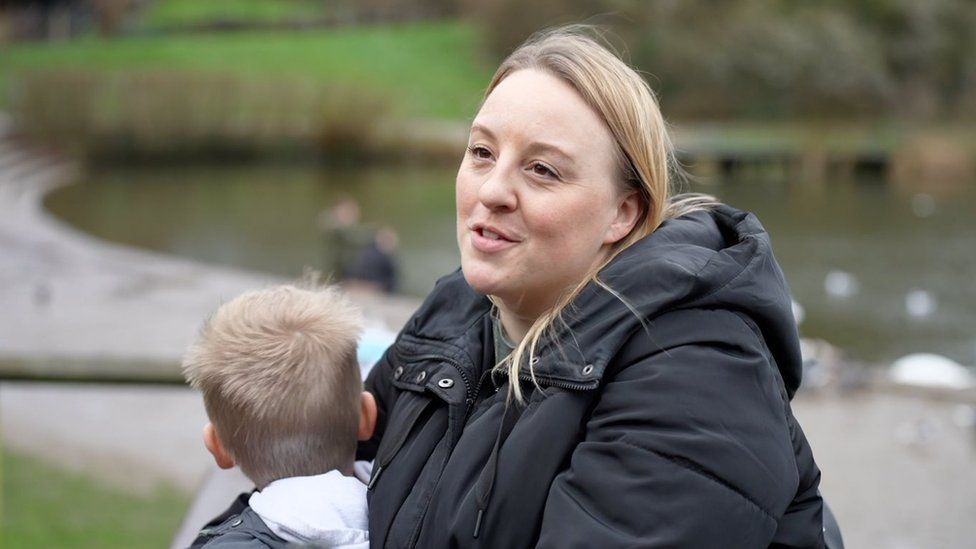
Jayne Howard fears families could end up paying the price for pressure on public finances.
By Alex Forsyth
Political correspondent, BBC News
Councils in England are in a state of financial crisis with many facing effective bankruptcy in the next few years unless the funding system is reformed, according to a new report.
More than half the councils that responded to a survey by the Local Government Information Unit said they were likely to be unable to balance their books in the next five years.
Two-thirds said they were cutting services, with parks, leisure facilities, arts and culture at the top of the list.
There have been repeated warnings about the state of council finances, with the government announcing an extra £600m of funding earlier this year to help plug budget gaps.
Despite that, many councils are currently setting budgets that will see service cuts from April, at the same time as increasing council tax and charges.
The Local Government Information Unit surveyed senior council leaders and officers, with responses from 128 authorities in England.
It found nine in 10 plan to raise council tax and increase fees and charges for things such as parking and environmental waste.
Nearly one-third of the councils that responded plan on cutting spending parks and leisure, with another third cutting arts and culture and one in 10 cutting services for children with special educational needs and disabilities.
Jonathan Carr-West, chief executive of the LGIU, said: “This year’s State of Local Government Finance report reveals the desperate, ruinous financial situation councils find themselves in. Cutting services, borrowing more money and spending reserves year after year is completely unsustainable. Citizens are being failed.
“With over half of councils warning us they are at risk of bankruptcy within the next Parliament, it is no longer possible to blame individual governance issues.
“There clearly is a systemic issue and rather than bungling local government panicked injections of cash, whoever wins the next election will need to reform the entire system, bringing back multi-year settlements based on an area’s need and developing new ways of revenue-raising.”
At Medway Council in Kent, they’re planning to increase parking charges, cancel some events and cut free swimming for under 16s and over 60s as they try to make ends meet.
Even then the council won’t be able to balance its books unless the government agrees exceptional financial support, meaning the council’s allowed to borrow £30m over the next two years.
Like many councils, they’ve seen particular pressure on adult social care, children’s services including transport for children with special educational needs and disabilities, and housing support.
The Labour leader, Vince Maple, who took over the running of the council from the Conservatives following elections last May, said: “We knew this was going to be a challenging first budget, even before the election we knew Medway’s finances were not in a great place.
“The government has got the future of Medway in its hands, I hope they make the right choice, but it makes me nervous, it makes me want to push as hard as we can to say to central government, we need help like we’ve never needed help before.”
Medway councillors meet to discuss budget pressures
At Capstone Country Park, near Chatham, families were contemplating the idea of paying for car parking – one of the options Medway Council is considering as it tries to get its finances straight.
Jayne Howard said: “They’ve wasted money all over the place, on frivolous things or things that don’t need doing, or middle management people that don’t need to be there and so there’s not enough left in the pot for the things that do need doing. And the answer is always to put it on the people on the bottom of the chain, charge us more for everything.”
Her friend, Rebecca Randall, was sympathetic to the council’s plight but was still concerned that families would end up paying the price for pressure on public finances.
“With the tiniest budget that they already have, I think it’s quite extreme to ask them to do everything,” she said. “But I don’t think it should be brought back down to the people.”
The Local Government Information Unit said the current situation would leave residents paying more for less, and called for reform of the way councils are funded in order to “save” the services they provide.
A Department for Levelling Up, Housing and Communities spokesperson said: “We recognise councils are facing challenges and that is why we announced an additional £600m support package for councils across England, increasing their overall funding for the upcoming financial year to £64.7 billion – a 7.5% increase in cash terms.
“This includes £500m of new funding for councils with responsibility for adult and children’s social care, distributed through the social care grant. Councils are responsible for their own finances and setting council tax levels, but we have been clear they should be mindful of cost-of living pressures while controlling any unnecessary or wasteful expenditures.”








